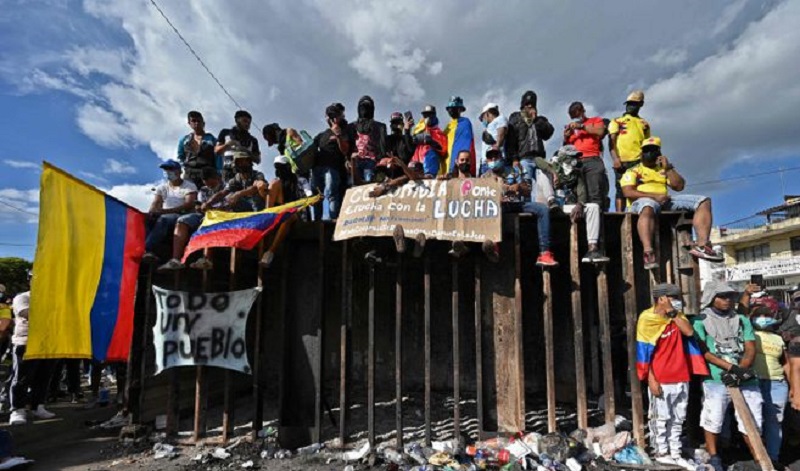Colombia has now been on national strike for more than a month. In these 36 days of mobilizations, which began April 28, there have been 5,575 rallies, 2,180 marches, 2,924 blockades, 598 mobilizations, and 22 assemblies in 809 municipalities. Also, in this period, more than 2,000 demonstrators have been injured, and according to the NGO Temblores and the Institute of Studies for Development and Peace (Indepaz), there have been 60 deaths during Colombian protests in the last month. The blockades in particular have been incredibly effective, having cost the economy about $2.68 billion.
This Wednesday, June 2, a new day of mobilizations was called for in the main cities of Colombia: Bogota, Cali, Manizales, Bucamaranga, Barranquilla, and Cartagena, among others. Over a month ago, a space was convened in Montería to gather representatives from different regions, proposing to listen to the communities and build consensus to solve ongoing problems. The Duque administration is betting that discussions with union representatives and different social organizations leading the anti-government protests will quell the unrest. Last week, the committee reached an agreement, but on Tuesday, June 1, they accused the government of backtracking and ended the talks. In the same way that the Duque administration subdued some of the more militant activists in the movement by engaging in ultimately fruitless discussion, the union leaderships grouped together to form the National Strike Committee (CPN), demobilizing the youth and workers who continue on the front lines. Despite denouncing the discussions, saying that the “dialogue is a trap,” the National Strike Committee has still been engaging in failed negotiations with the Colombian government, while the more militant sectors continue to protest in the streets, especially young urban workers.
#Meta En estos momentos la movilización social en las calles de #Villavicencio. #ParoNacional2J pic.twitter.com/tKSaBcwu00
— Conpazcol 🇨🇴⚠️#SOSColombiaDDHH (@ConpazCol_) June 2, 2021
Yesterday, when the CPN called for mobilizations, they made a call to unblock the roads of the country. This is a demand of the Duque government and of the bourgeoisie, for which they can not afford to deploy the army to repress the vanguard organized in these blockades. Ending the blockades would be a totally conciliatory act on the part of the union bureaucracy in favor of the pockets of the Colombian businessmen. The blockades, after all, are what make the national strike effective. As shown by the figures published by the newspaper El Tiempo, 100 billion pesos are being lost daily in Valle del Cauca alone.
According to the CNP, they have managed to lift 40 blockades in order to “reestablish the supply of food, fuel and medical supplies in the cities of Colombia,” something totally false because these organized blockades have arranged humanitarian and sanitary supply channels so that there is no shortage of basic necessities for life. The CNP is concealing that its activity is linked to the reestablishment of “normality” in Colombia without any intention of putting up a fight to overthrow Duque through mobilization.
The unblocking of the roads has been the key demand from the beginning, requested by the national government before they will start the discussions. The Strike Committee assures that “there is no longer any reason not to sign the pre-agreements that came out of the meetings that have been taking place for several weeks.” It is still not known what these agreements will be in the end.
#ParoNacional2J 🇨🇴 #Bogotá Por la carrera 13 avanza movilización sindical encabezada por indígenas #Misak rumbo a la plaza de Bolívar en donde se espera a otro grupo de manifestantes que salió desde la U.Nacional #ElParoNoPara pic.twitter.com/eutgeVl1ww
— Contagio Radio (@Contagioradio1) June 2, 2021
After several weeks of dirty campaigns against the demonstrations, most of the mobilizations were limited to artistic activities, isolating the most militant sectors. The organizations that make up the National Strike Committee, together with different sectors of the political spectrum (including the progressives of Gustavo Petro’s Historic Block), have not won concessions from the government but are still being asked to tell protesters to stop the blockades. It is, furthermore, a demand that the most right-wing sectors have been making, such as the bosses who see their profits affected by the blockades, or the ultra-right-wing and former president Alvaro Uribe, who has been pressing for an even more repressive policy.
El #ParoNacional no lo para nadie hoy seguimos. #ParoNacional2J pic.twitter.com/WOJLHgEnQK
— Diego Otavo (@diegootavoph) June 2, 2021
A large part of the youth has expressed in different ways that they do not feel represented by the organizations that make up the Strike Committee. And in spite of all the coordinated efforts of the different parties that make up the Colombian political system, there are still vanguard sectors of the student and worker youth mobilized and organized in the blockades, making the national strike effective and showing that popular mobilization is key.
The only thing that can stop the repressive advances is the mobilization and organization of the sectors in struggle. It is clear who the “dialogue” favors. The National Strike Committee should immediately break off all negotiations with the government until it withdraws the military, stops the repression, and releases all those detained.
This would be the first step to strengthen the mobilization with a plan to impose a real national strike, paralyzing the total production of the country to achieve the demands of the rebellion and to throw out the repressive government.
Originally published in Spanish on June 2, 2021 in La Izquierda Diario.
Translated by K.S. Mehta.











